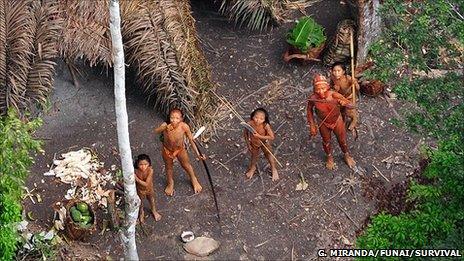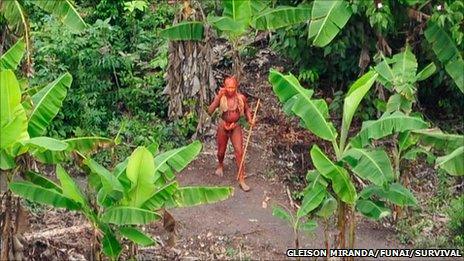New images of remote Brazil tribe
- Published

The group appears to be healthy and thriving
New pictures have been released of an isolated tribe living in rainforest on the Brazil-Peru border.
Brazil monitors many such tribes from the air, and they are known as "uncontacted" because they have only limited dealings with the outside world.
Photographs of the same tribe were released to the world two years ago.
Campaigners say the Panoan Indians are threatened by a rise in illegal logging on the Peruvian side of the border.
But Brazilian authorities believe the influx of loggers is pushing isolated Indians from Peru into Brazil, where the two groups could come into conflict.
Survival International, the campaign group that released the pictures, says the group is likely to be in good health, with baskets full of manioc and papaya vegetables grown in their communal "gardens".
The tribe in question could be descended from indigenous people who fled the "rubber boom" around a century ago, when wild rubber became an international commodity and forest areas were opened up.

The tribe has a communal garden where banana and annatto trees grow
These pictures were taken by Brazil's Indian Affairs Department, which monitors the indigenous groups using aircraft. The remote tribe has also been filmed by the BBC for its Human Planet series.
Members of the tribe are seen covered in red paint (known as urucum), which is made from seeds from the annatto shrub. Indigenous people use it to colour hammocks and baskets, as well as their skin.
The group is also seen using steel machetes - which must ultimately have been obtained from outside the forest. Fiona Watson, field and research director for Survival International, said the people are likely to have acquired these through trading links with other forest tribes.
"These networks have been in existence for centuries and I don't think they will have had any contact with non-tribal people, because if they had, the chances of being killed or contracting a disease to which they have no immunity are very high," said Ms Watson.
Ms Watson added that some authorities denied the existence of such tribal groups in the forest, in order to further their aims.
- Published26 July 2010